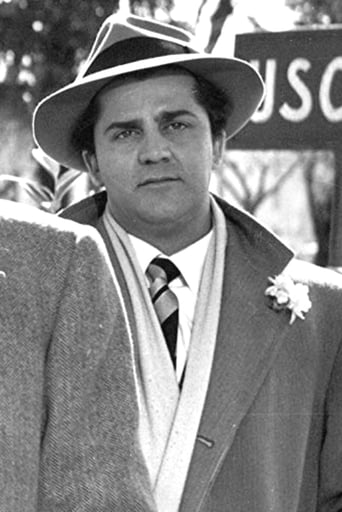PassPopcorn
I Vitelloni is one of the lesser known movies by the world famous Italian filmmaker Federico Fellini. And even though it's not well-known, apparently it is Stanley Kubrick's favourite movie of all time, and is also praised by Martin Scorsese and George Lucas. Also, in my opinion, it should definitely be seen by movie- and Fellini-lovers alike, along with the famed 8 1/2 and La Dolce Vita – and especially if you're not very fond of Fellini's excursus in pure comedy, like in Lo Sceicco Bianco. I Vitelloni is a classic Fellini drama: there are a few good laughs, but melancholia is a constant and the ending is not exactly a happy one.I Vitelloni follows five friends – Moraldo (Franco Interlenghi), Alberto (Alberto Sordi), Fausto (Franco Fabrizi), Leopoldo (Leopoldo Trieste) and Riccardo (Riccardo Fellini) – who are in their thirties but haven't done anything with their lives and don't even have jobs, so they spend their days and nights fooling around and wasting time. When Fausto is forced to marry Sandra (Leonora Ruffo), because he impregnated her, the others – and especially Alberto – start questioning their existence and their future, while going on with their everyday lives: Leopoldo tries to write a good play, Alberto gets drunk and depressed, Fausto cheats on his wife and Moraldo, the quiet one, observes and narrates the story for the audience."Vitelloni" is a term that was used among young people living in Pescara – the city where Ennio Flaiano, one of the screenwriters, was born – to indicate other young people who spent their days doing nothing, mostly because it was very difficult to find a job in the post-WWII period (which is when the movie is set, too). It was also a very risky investment: Fellini's previous film, The While Sheik, had flopped, and he decided to cast Alberto Sordi, whom the audience didn't like. Still, the movie was well received and won some important Italian prizes, and it was Fellini's first movie with international distribution. All of this, I think, was well deserved. I Vitelloni focuses mainly on atmosphere: it starts happily, at the end of the summer. However, the main characters soon start complaining, because there's nothing to do in their small town during the winter, and their negativity projects outside, on Fausto, who is forced into a marriage he doesn't want. Also, everyone talks and thinks about leaving, but nobody does.The thematic and the atmosphere give a constant feeling of melancholia, and every fun activity of the vitelloni is interrupted by something bad: for example, Alberto chases a dog on the beach and discovers that his sister is seeing someone he doesn't like, again. All the actors are very good and likable in their roles, but I think Sordi really stands out, as he manages to portray a seemingly carefree man who acts like a fool most of the time, but is actually very sensitive and troubled. It is also great seeing the contrast between the young and the old: the vitelloni don't want to become serious adults, because all the adults in the movie are negative and lead boring lives. Ultimately, the vitelloni find it hard to abandon the gang, after so much time they've spent together. All in all, this is a great movie about serious growing up that will make you remember the days of youth and untroubled fun, and while nostalgic, you'll also clearly realise why it's so important to, eventually, leave all of that behind.Rating: 8/10 Read more at http://passpopcorn.com/
Rindiana
Fellini's first masterpiece may not be as well-known as later classics, but it's just as wonderful, fortunately lacking the maestro's later (sometimes overbearing) tendencies to turn to caricature and the grotesque.The director's humanity and the resulting poetic images in beautiful black-and-white photography enrich a basically neo-realist plot and turn it into something magical. We not only care for these five young men, we become them, parts of them, at least.This is deeply emotive film-making.9 out of 10 sad days at the seaside
christopher-underwood
A marvellous, involving and moving, swirling, humane and believable look at life an Italian seaside town. At first when we are introduced to the bunch of 'young' men, I thought that, as with US and UK films of the period, we were having to accept 30 year olds as 20 year olds. But no! These layabouts, loafing about, picking up girls and older women, are 30 year olds still living with their mamas and expecting everything to fall into their laps (and their lips!). Getting pregnant still a big deal, of course, and if the 'youngsters' think little of the consequences the older generation certainly seem to get together to get some sort of result. There are many wonderful sequences in this, ever beautiful tapestry of life in the 50s and the director even manages to get in plenty of carnival in this early film.
adrian290357
I first saw I VITELLONI in my university days in 1981. On a recent visit to London, I found a compilation of neorealist films going at an inviting price and bought it. I am glad I did, if for no other reason because I have enjoyed watching I VITELLONI far more this time. The fact that I am now 27 years older might have helped this change in perception but I put it down principally to the sheer quality of the direction, acting, and the superb psychological insight into a time of defeat in a nation long known for its multifaceted greatness. And there are touches of the surreal, particularly in the Carnival segment, that announce the later Fellini, one I like a little bit less despite producing awesome works such as AMARCORD. The characters are keenly observed, none better than the married man who cannot keep away from other women and the two brothers whose sisters fall for men they know to be worthless. One of those sisters leaves town in the company of a man who seems a criminal, the other stays in town with a husband who seems to have mended his ways... but does one ever mend one's ways? The latter's brother, Moraldo, leaves town in the end for an uncertain future that at least will take him from local limitations but he hardly seems equipped to deal with life in Milan or Rome. One final delight: The chiaroscuro photography is outstanding in its ability to convey mood. A well deserved 10 out of 10!






